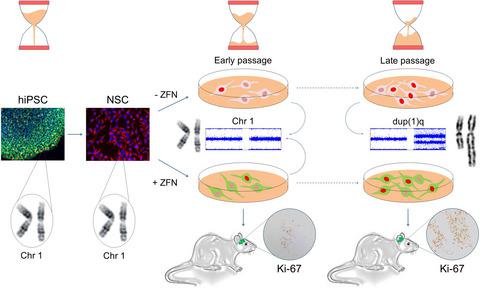当前位置:
X-MOL 学术
›
Cell Prolif.
›
论文详情
Our official English website, www.x-mol.net, welcomes your
feedback! (Note: you will need to create a separate account there.)
Acquisition of chromosome 1q duplication in parental and genome-edited human-induced pluripotent stem cell-derived neural stem cells results in their higher proliferation rate in vitro and in vivo
Cell Proliferation ( IF 5.9 ) Pub Date : 2020-09-12 , DOI: 10.1111/cpr.12892 Narges Zare Mehrjardi 1, 2 , Marek Molcanyi 1 , Firuze Fulya Hatay 1 , Marco Timmer 3 , Ebrahim Shahbazi 2 , Justus P Ackermann 4 , Stefan Herms 5, 6 , Stefanie Heilmann-Heimbach 5 , Thomas F Wunderlich 4, 7, 8 , Nora Prochnow 9 , Aiden Haghikia 9 , Angelika Lampert 10 , Jürgen Hescheler 1 , Edmund A M Neugebauer 11 , Hossein Baharvand 2, 12 , Tomo Šarić 1
Cell Proliferation ( IF 5.9 ) Pub Date : 2020-09-12 , DOI: 10.1111/cpr.12892 Narges Zare Mehrjardi 1, 2 , Marek Molcanyi 1 , Firuze Fulya Hatay 1 , Marco Timmer 3 , Ebrahim Shahbazi 2 , Justus P Ackermann 4 , Stefan Herms 5, 6 , Stefanie Heilmann-Heimbach 5 , Thomas F Wunderlich 4, 7, 8 , Nora Prochnow 9 , Aiden Haghikia 9 , Angelika Lampert 10 , Jürgen Hescheler 1 , Edmund A M Neugebauer 11 , Hossein Baharvand 2, 12 , Tomo Šarić 1
Affiliation

|
Genetic engineering of human‐induced pluripotent stem cell‐derived neural stem cells (hiPSC‐NSC) may increase the risk of genomic aberrations. Therefore, we asked whether genetic modification of hiPSC‐NSCs exacerbates chromosomal abnormalities that may occur during passaging and whether they may cause any functional perturbations in NSCs in vitro and in vivo.
中文翻译:

在亲本和基因组编辑的人类诱导多能干细胞衍生的神经干细胞中获得染色体 1q 重复导致其体外和体内增殖率更高
人类诱导多能干细胞衍生神经干细胞(hiPSC-NSC)的基因工程可能会增加基因组畸变的风险。因此,我们询问了 hiPSC-NSCs 的基因修饰是否会加剧传代过程中可能发生的染色体异常,以及它们是否会在体外和体内引起 NSCs 的任何功能扰动。
更新日期:2020-09-12
中文翻译:

在亲本和基因组编辑的人类诱导多能干细胞衍生的神经干细胞中获得染色体 1q 重复导致其体外和体内增殖率更高
人类诱导多能干细胞衍生神经干细胞(hiPSC-NSC)的基因工程可能会增加基因组畸变的风险。因此,我们询问了 hiPSC-NSCs 的基因修饰是否会加剧传代过程中可能发生的染色体异常,以及它们是否会在体外和体内引起 NSCs 的任何功能扰动。











































 京公网安备 11010802027423号
京公网安备 11010802027423号